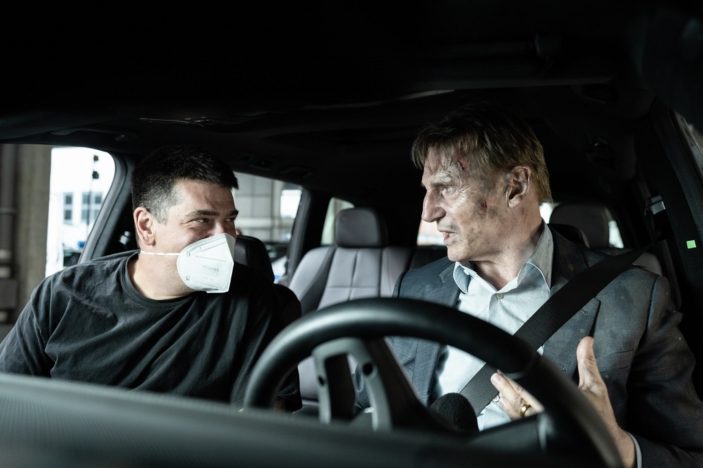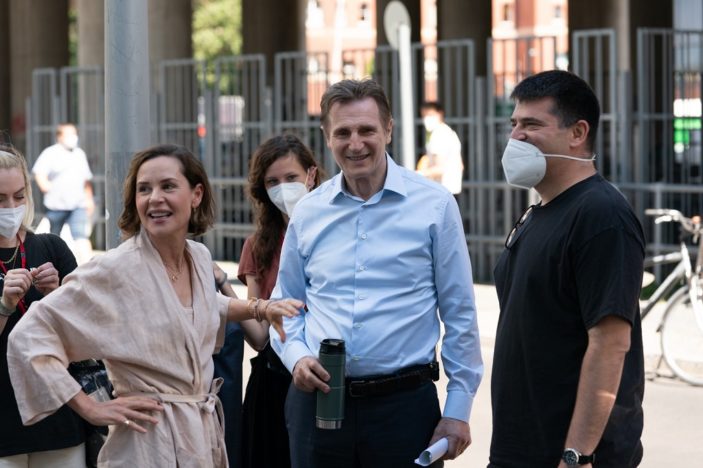
As a filmmaker Nimród Antal has effortlessly aligned himself within the action-thriller genre space. Whether he’s terrorising Luke Wilson and Kate Beckinsale in the snuff-film horror Vacancy, or exercising the limits of predator and prey in the science-fiction sequel Predators, the Hungarian director knows his way around a thrilling set-piece; something that came in handy for his latest bout behind the camera.
A remake of the Spanish thriller El Desconocido, Retribution is an immersive ticking clock thriller about Matt Turner (Liam Neeson), a successful Berlin based American businessman juggling a booming financial career with family responsibility. Driving his kids to school one morning, Matt receives a phone call from a mysterious voice: there’s a bomb under his seat that will detonate unless he completes a specific series of tasks, and fast. Trapped in their car in a high-speed chase across the city, Matt must follow the stranger’s increasingly dangerous instructions in a race against time to protect his family and solve the mystery that plays out over the course of one day.
Ahead of the film’s release in Australian cinemas this week, Peter Gray spoke with Antal about directing the confined action, what he learned about filmmaking on set, and working with such a large ensemble cast.
Retribution is a remake of a Spanish film, that I believe translates as The Stranger. Was that a film you were familiar with when taking this on?
I certainly became aware of it when I was sent the script, and it was explained to me that this would be a remake. I had never done a remake before, so one of the things I did to ensure that I wasn’t creating an aftertaste was I avoided watching it. I haven’t seen the original, or any of the other takes on the film.
Without giving anything away, obviously, this film offers up certain surprises towards the back end of the film. Is it reveals like that when you receive a script that make it more exciting? And does it hold any weight on whether or not you say yes when you realise where the story goes?
I think if I recall, when I started reading it it was the contained idea of it all that I found appealing. Whether you’re talking about cooking or architecture, or engineering, it’s always the simplest form that is the most superior. And something like this, where from the get-go it’s relatively stripped down. That’s hyper appealing, trying to challenge yourself as a filmmaker.
I love the fact that this last 15 years we’ve had Liam Neeson rebranded as an action star. Knowing you were working with him, how did it feel knowing you were working with someone so comfortable in their wheelhouse?
Clearly you try to come up with an approach that you feel is going to separate it, or you’re trying to discover elements within it that make it a little bit different. You try to lean into those elements, you try to exploit those elements as best as you can. In this film there was an interesting and extremely dysfunctional family dynamic which was beyond the suspense and beyond the thriller aspect. I thought the dysfunction within the family was super interesting and relatable to so many people that have to try and balance their work and their family, and at the end of the day, family is all that really matters.
On top of Neeson, there’s Matthew Modine, Embeth Davidtz, Lilly Aspell, Jack Champion…
The reality is, if I don’t have a really talented actor, if I don’t have a really talented production designer, if I don’t have a really talented editor…if I don’t have all those team players in place, then I’m not as good as I could be. And a lot of filmmakers, I think, dismiss this or choose conveniently to dismiss this concept. The reality is a filmmaker is only as good as those that he or she is surrounded by.

And action, I feel, can be a difficult genre to master when you have a narrative and the set-pieces that have to complement each other. Knowing that Retribution is so confined to just the car setting, how challenging is that to not only bring the film’s drama element, but the action too?
It was interesting. There was a day or two of action that we had captured, and, you know, with any film you find a road to take and you start to add things on. You’re trying to pack on concepts (and) ideas that you think are going to benefit the film. More often than not, if you’re lucky, those things work. There are times, though, that the film kind of throws something off of itself. Like the film refuses to allow something because it stands out. And not in a good way, per se. It’s not even a bad way, it’s just maybe foreign to the language that you’re already speaking.
Sometimes you come up with a bit of action that’s very cool on paper, and it’s even executed in the correct way, but you try to put it in the movie and suddenly you see clearly that it doesn’t belong there. So the action in this film we added another day or two to really elaborate things that the car was doing. Mostly due to me. I had a theory as to why I was doing what I was going, but then later in the editing room I found that some of it wasn’t necessary. It felt as if we were doing it for the sake of doing it, as opposed to adding or bringing something to the film.
Does that kind of add an extra layer of excitement? Reflecting on the films you’ve made so far, getting all the shots, and then coming together to realise it doesn’t fit, is there an excitement in realising how much you’re still learning?
Every time I finish a movie, I’m like, “I’ve seen it all.” Sometimes it isn’t even like practical filmmaking. There’s a lot of ego, there’s politics, there’s all kinds of other things that are involved. There’s practical budgetary issues. “We need four days to shoot this”, but you only have three…there’s a lot of those kinds of things at play as well. I mean, I finish every movie thinking that I know everything now. Then the second the new film starts, or the new project starts up, I’m suddenly aware of obstacles or problems that I’ve never encountered before. But I do solve these things. Sometimes it’s filmmaking (but) more often than not it’s politics, and it’s other things that have nothing to do with the craft.
On the mention of the action earlier, is there a particular sequence in Retribution that challenged you the most?
The blockade in Retribution is very detailed. There’s 100 setups in that sequence of just different little minutiae that all add to the tension of what we’re trying to evoke. When you’re trying to focus on so many different little beats within, because in that particular moment you’re dealing with all the different characters’ emotions, storyboards are a really wonderful tool in that regard of seeing (it) laid out in front of you. You can immediately identify that you need a close-up of.
As a director you’ve always placed in the thriller space in some capacity. Was there a film that you remember seeing when you were young or when you were studying that stuck out for you as the one that made you want to make movies? Or aligned with that genre in particular?
Some of my earliest memories were Star Wars, Escape from New York, and Mad Max. Then a little later on I became very fond of Scorsese’s Taxi Driver, Ridley Scott’s Blade Runner, and as the years progressed the Coen Brothers blew me away with Miller’s Crossing and Raising Arizona. Those were always so inspiring. And Quentin, you know, Reservoir Dogs and Pulp Fiction…those were all movies that I was incredibly taken aback by. As a young man I had a next-door neighbour who was a makeup artist, and he was a friend of my father’s and would take me on sets as a kid. I remember there was a TV show based on a film called Alien Nation, it was a great movie, I love the movie, and they made a TV show about it.
I remember this guy walking by with a roll of cables over his shoulder, and that was the first time I kind of understood, like, “Wow, this is a job that you can do.” I had an incredible passion for film. If I had a good time, I went to go see a movie. If I had bad times, I went to go see a movie. So understanding that maybe I could build a life for myself or support myself doing this was a very appealing prospect.
Retribution is screening in Australian theatres from September 21st, 2023.
